Surprise, surprise: Tom King screwed up the Riddler with character assassination (One Bad Day: The Riddler). Tom King being the best at what he does (character assassination), he also managed to do so to Batman at the same time. So let's recalibrate with my definitions of what the Riddler is.
The Riddler is theatrical.
This may seem redundant, since he's a Batman villain; aren't they all theatrical? But think about it; Catwoman; Scarecrow; Penguin; Two-Face. Thematic? Yes. Dramatic? At times. But not in-universe theatrical; they don't really 'put on a show.' The Riddler, on the other hand...
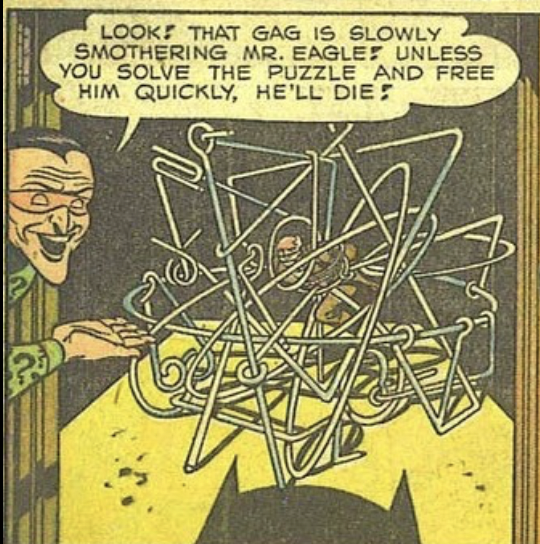 |
| I bet he put on the "Jeopardy" thinking music. |
 |
| He's corny, too. |
 |
| Even Judd Winick gets it. |
The Riddler is an intellectual not a goof.
Most creators get this right; it's hard not to.
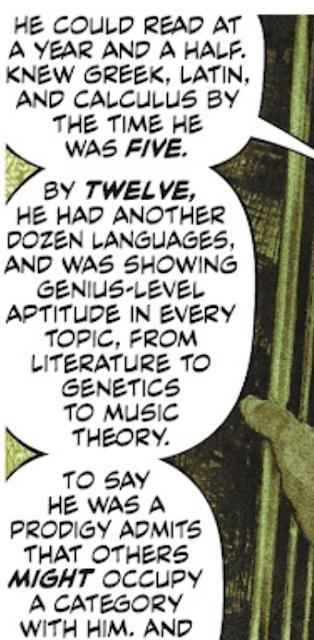 |
| I mean: even Tom King got that part right. |
It's an essential part of his characterization. The unfortunate result is that most writers can't write the Riddler because they are not sufficiently intellectual; it's pretty daunting to be asked to write a villain who comes up with puzzles that stump BATMAN. So, as discussed in the post linked above, they cop out and just make him goofy.
The Riddler is not about solving problems; he is about posing them.
Not to put too fine a point on it but: He's not called "The Solver"; he's "The Riddler". This is why all those interpretations where the Riddler reforms (to a some degree, at least) and occupies himself with solving mysteries are ... incorrect. The Riddler already knows that--given time and opportunity--he can solve any riddle. He'll cheat if he has to to SOLVE a mystery.
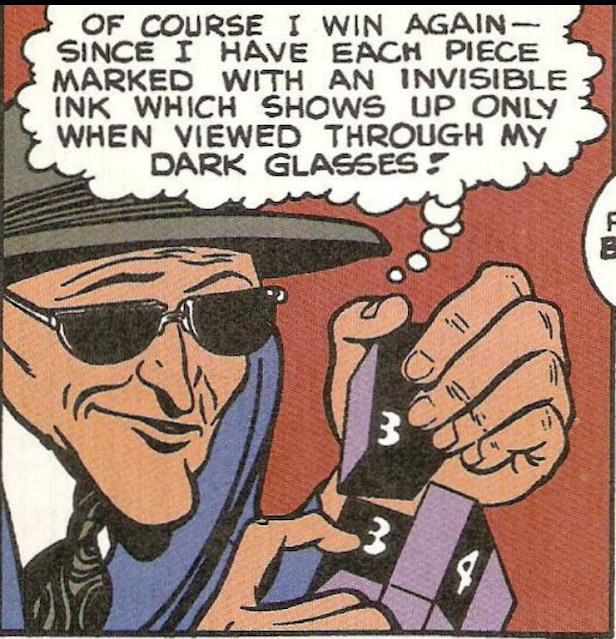 |
| It's part of his origin, after all. |
But the Riddler would never cheat by giving you a mystery that can't be solved.
The Riddler is an inversion of the Batman, in this respect. The Riddler is a criminal who creates mysteries for his own sake; Batman is a detective who solves them for the sake of others.
The Riddler isn't crippled by a 'compulsion' to give clues.
I remember when this idea was introduced (well, I remember when I bought the comic wherein it was). As I've mentioned before, Golden Age writers got what made villains VILLAINS, rather than mere criminals.
Well, yes, presentation; and the Riddler certainly has that and it's part of what I mean. But what I meant was classic villains are not minimalists. They are not trying to do the least they can do, to just score some swag under the radar, and not get caught; that's what criminals do.
Villains steal things because those things are thematically appropriate, not simply things that are valuable. Villains don't always hide their crimes; they let you know that they did (or, sometimes, even what they are about to do). Villains aren't avoiding challenge, they are looking for a challenge. Villains are performance artists; they are putting on a show, even if they are the only audience.
The Riddler is a true villain. He's not "compelled" to give clues; he chooses to. It's the point of what he's doing; the crimes are just a macguffin. The Riddler's M.O. isn't a fatal flaw; it's a distinguishing feature.
 |
| Another one of the many things Tom King does not understand. |
The Riddler doesn't kill ... gratuitously.
Certainly, the Riddler WILL kill: He loves his Batman-deathtraps.
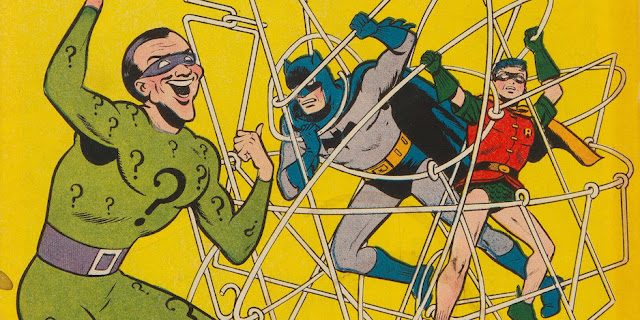 |
| It's part of his origin, after all. |
But it's never the goal. In fact, it's generally not among his repertoire. Why? Well, it's never stated explicitly, but it's a pretty easy mystery to solve. The Riddler doesn't kill for (essentially) the same reason that Batman doesn't: it's too easy.
 |
| Sure, he might kill you accidentally, but that's your own poor luck. |
Oh, sure, Batman has "a moral code" whereas the Riddler's has "rules of the game". But the Riddler, as a truly classic villain, has to impose limits on himself, and allowing himself to kill would spoil his game; it's too powerful an advantage.
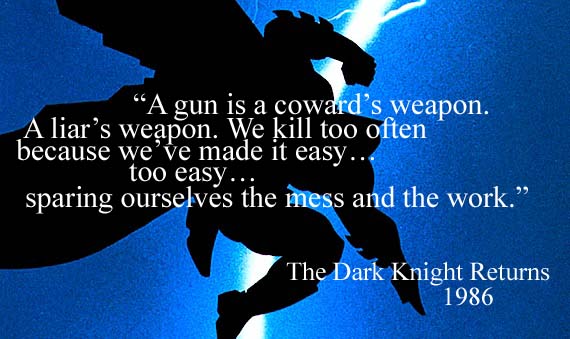 |
| Batman doesn't use a gun because it would make killing too easy. It's part of his origin, after all. |
So naturally Tom King in One Bad Day: The Riddler not only has the Riddler become willing to kill, his character arc for Batman has HIM becoming willing to kill, too. It all makes perfect sense...if you're Tom King, the kind of writer who's only interest is in 'taking characters where they've never been taken before".
Well, when a character's been around as long as these have, if they haven't been taken to a particular "somewhere", it's probably because it's a terrible idea, not because you're the First Writer Brillant Enough to Think Of It, Tom.
 |
| Peter Milligan went there first, anyway. |

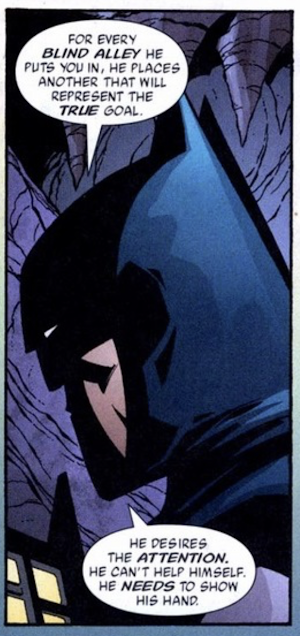


5 comments:
"Well, when a character's been around as long as these have, if they haven't been taken to a particular "somewhere", it's probably because it's a terrible, not because you're the First Writer Brillant Enough to Think Of It, Tom."
This. Honestly, I think Tom King's got a lot of talent as a writer; what he really needs is an editor capable of saying, "Tom, that's an interesting idea, but it does damage to the characters rather than enriching them".
I noticed the comment about Winick, and I know he's rarely anyone's favorite writer, but he at least seems to understand the importance of preserving what is central to a character. He's even responsible for one of my favorite Superman moments, and it's one of those rare "somewheres" that actually matters: Superman confronting the wizard Shazam for putting so much responsibility on a young boy.
https://twitter.com/jp_jordan/status/1403815695222296577
The Riddler was my favorite Bat-villain when I was a kid. Frank Gorshin had a lot to do with it (plus he wore my favorite color, green). As an adult, he’s still a favorite, but I rarely like Riddler stories. Yes, it’s hard to think of good riddles. Guess what? The best Riddler story published in my lifetime, Batman Adventures 10, didn’t feature a play-fair riddle. He’s hard to write, sure, but worth the work.
“Dark Knight, Dark City” didn’t feature a typical Riddler, but Batman saying they had “a… sporting relationship” informs how I see the character to this day, pause included.
(The above was from me)
- Mike Loughlin
"The best Riddler story published in my lifetime, "
I'm curious why you felt that.
SPOILERS for Batman Adventures 10, for any random person reading this:
In “The Last Riddler Story,” the title character is depressed and ready to hang up his bowler because Batman always outsmarts him. He agrees to try one more riddle-crime. If Batman beats him, he’s done. Then:
- No one in Gotham can solve his riddle.
- He commits the crime, only to be stopped by Batman. He can’t believe Batman solved his latest and best riddle!
- But… Batman couldn’t solve it! He deduced what the Riddler’s most likely target was, and happened to be right.
- The Riddler is the happiest he’s ever been, and sings his way through his trial and sentencing. He finally beat Batman!
In this issue, Riddler is endearing, despite his smugness. He loses, but wins the more important intellectual battle. He doesn’t kill anyone or take over the city or figure out Batman’s identity through super-drugs or something. All he wanted to do was validate himself and his life choices, and he succeeds… sort of.
It’s an entertaining story with excellent Mike Parobeck art. The only other post-Crisis Riddler comics I’ve read that I rate highly are the Gaiman/BEM Secret Origins story (more of an interview and rumination, but we’ll-done) and “Dark Knight, Dark City” which is a good Batman horror story. The Riddler being a pawn of a demon makes it less of a pure Riddler story, at least to me. I also liked the “Riddler: P.I.” idea but the only story from that era that grabbed me was the first.
I know I read a handful of other Riddler stories in the ‘90s, but they don’t stick out in my memory. After that, I can’t say I’ve loved how he’s been used in the last 20 years.
Post a Comment